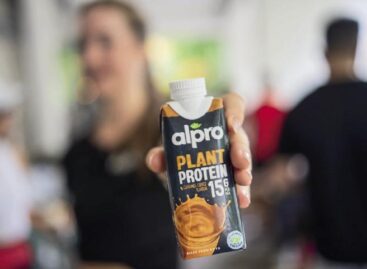Hungary must become self-sufficient in potatoes
Hungary must become self-sufficient in potatoes, the goal is to achieve this, the Minister of Agriculture announced on Friday in Kiskunhalas, Bács-Kiskun County.

(Photo: Pixabay)
At the 10th Kiskunhalas Potato Days event, István Nagy, as its main patron, said: potatoes are practically the third most popular and basic food all over the world. “Hungary cannot be exposed to the vulnerability of not being self-sufficient in potatoes,” he stressed. He added that consumer habits and climate have changed. These are the two external reasons why Hungary is currently not self-sufficient in potatoes, and this must be changed, he said. The government will provide all assistance for the change – he emphasized. It is time to create all the conditions for the Hungarian people to be able to buy Hungarian potatoes every day of the year, he stressed. This requires, on the one hand, that a good variety is available, so domestic potato breeding must be supported at the government level. On the other hand, it must be possible to always have the required quantity available in the retail network, he said. He explained that potatoes are grown in 159 countries of the world on a total of almost 18 million hectares. With more than five thousand varieties, the potato not only plays a key role in the global food supply, but also provides adequate assistance in the fight against climate change. Seven of the world’s ten largest potato-producing countries and five of the ten largest consumer countries are located on the European continent. In recent years, on average, 190,000 to 300,000 tons of potatoes were grown in Hungary on 8,000 to 12,000 hectares, he reported. He emphasized: the operation of the horticulture sector is a priority for the Ministry of Agriculture. From the point of view of competitive domestic potato cultivation, the Common Agricultural Policy (CAP) system has provided a serious opportunity for economic actors in recent years, primarily through the support of technological developments necessary for the creation of a marketable commodity base. Within the framework of the Rural Development Program (RP), the supportability of the development of all technological elements related to potato cultivation has been established, he said.
In 2021-2022, more than 10,000 agricultural and food industry enterprises were approved for development support in the amount of HUF 1,200 billion
As part of the Rural Development Program’s investment appeals directly affecting the horticulture sector, a decision has already been made on a subsidy amount exceeding HUF 184 billion through more than 6,900 winning applications – he explained. The investment tenders announced this year as part of the Kap Strategic Plan help and support the same development goals – known in the Rural Development Program – for all producers who see market potential in potato cultivation.
Horticulture can still count on support for the purchase of machines and tools and the construction of vegetable storage facilities
A separate intervention serves to increase the energy self-sufficiency of agricultural – including horticultural – plants and reduce energy dependence. István Nagy spoke about the fact that in June of this year, a call for tenders with a total amount of HUF 50 billion was published to support post-harvest developments related to horticultural greenhouses and cold storages, for which applications for support can be submitted from September 24. The amount of support that can be obtained can be HUF five billion. It is a novelty that the subsidized projects can now be implemented in thirty-six months instead of the previous twenty-four months, he said. The minister also touched on the fact that calls for tenders to help increase the value of agricultural products with a budget of HUF 200 billion have appeared, which provide assistance for investments in potato processing. The level of support can be 50 percent of all eligible costs, and in the case of the use of technologies aimed at the utilization of renewable energy, it can extend up to 70 percent of the costs. In the case of a young farmer applicant and the transfer of the farm, the support intensity can be increased by 15 percent, and in the case of a beneficiary engaged in ecological farming and collective investment, a 10 percent increase in support intensity can be achieved. In the case of complex investments, applications can still be submitted – he said. He also said that the application to support the purchase of horticultural machinery will be available again, which will support the purchase of machines and tools necessary for cost-effective production. According to the plans, the submission of grant applications can start next year, he said.
MTI
Related news
In 2025, FruitVeB considered the support and professional coordination of the TÉSZs as its priority task
🎧 Hallgasd a cikket: Lejátszás Szünet Folytatás Leállítás Nyelv: Auto…
Read more >Related news
Focus on the domestic fishing sector at SIRHA Budapest
🎧 Hallgasd a cikket: Lejátszás Szünet Folytatás Leállítás Nyelv: Auto…
Read more >Where wheat turns into flour and data: this is how the domestic milling industry is digitizing
🎧 Hallgasd a cikket: Lejátszás Szünet Folytatás Leállítás Nyelv: Auto…
Read more >High-protein products are taking over
🎧 Hallgasd a cikket: Lejátszás Szünet Folytatás Leállítás Nyelv: Auto…
Read more >








